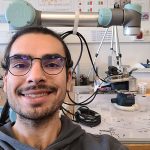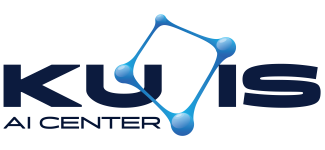
Enes Ulaş Dinçer, PhD student in Mechanical Engineering
Can you briefly introduce yourself and share your background in AI research?
Hello, my name is Enes Ulaş Dinçer. I graduated as the first-ranked student from Istanbul Technical University’s Control and Automation Engineering department in 2022. After working 7 months at BAYKAR, focusing on simulation and modeling, specifically Hardware-in-the-Loop (HIL) systems, I commenced a direct PhD at Koç University. I am a KUIS AI fellow, currently studying in the mechanical engineering department. My research focuses on physical human-robot interaction (pHRI) under the supervision of Prof. Çağatay Basdogan. I have a strong foundation in AI, reinforced by courses in Deep Learning, Reinforcement Learning, and Medical Image Processing. My work primarily involves integrating AI to enhance robot responsiveness in dynamic interaction environments.
What initially sparked your interest in the field of AI? Was there a particular moment or experience that inspired you to pursue this area of study?
My fascination with AI started with understanding the complexities of controlling robots, especially when you don’t have a clear model of the robot’s environment. This challenge intrigued me. A major turning point was when I saw what Boston Dynamics was doing with their robot, Atlas. Watching Atlas move and interact with its surroundings was incredible and made me want to be part of this exciting field, working on AI in robotics.
Could you tell us about your current research or thesis topic in AI? What motivated you to choose this specific area?
Right now, I’m working on a project that combines AI with physical interactions between humans and robots. The goal is to make robots understand and adapt to how humans work alongside them. We use a technique called a random forest classifier to figure out if the human and the robot are working well together or if there’s some conflict. Depending on this, the robot changes its behavior to either assist more or follow the human’s lead. I’m interested in making robots more intuitive and helpful partners in different settings. It’s exciting to think about the potential impact of this work in various industries, from manufacturing to healthcare, where collaborative robots can make a big difference.
What are some of the key challenges you’ve encountered during your research? How have you been able to overcome them?
Throughout my research journey, I’ve encountered various obstacles, ranging from minor setbacks to major hurdles. One significant challenge has been in writing and articulating complex ideas clearly. I’ve tackled these issues by breaking down the problems into smaller, manageable parts, much like using dynamic programming in computer science. This approach not only helps me systematically address each aspect of the problem but also reduces the stress and overwhelm that can come with big challenges. It’s about tackling one piece at a time, ensuring steady progress, and maintaining clarity in my work.
What excites you the most about the potential applications of AI in the real world? Are there any specific domains or industries where you believe AI can make a significant impact?
The potential of AI in healthcare is particularly thrilling. Its ability to enhance early disease detection, personalize treatments, and support medical research holds the promise of revolutionizing patient care and outcomes. AI’s role in streamlining healthcare processes and improving diagnostic accuracy can significantly impact public health and well-being.
How do you balance your academic workload, personal life, and the demands of your AI research? Do you have any strategies or tips that have helped you maintain a healthy work-life balance?
Maintaining a balance between my academic workload, personal life, and research demands is crucial. I’ve found that careful planning is key. I use a weekly calendar to schedule my tasks, allocating approximate times for each activity, including reading, research, and even physical exercise to stay active. Planning ahead allows me to make more informed and less impulsive decisions when it comes to managing my time. I also make sure to set aside time for rest and hobbies, believing that a well-rounded life fuels better academic and research performance. I encourage everyone to set short and long-term goals but also to treat themselves kindly throughout the journey.
A book and movie that you recommend (they don’t have to be related to ai)
For a book recommendation, I suggest the ‘Triplet of Pia Mater, Arachnoid Mater, and Dura Mater’ by Serkan Karaismailoğlu. It’s a neuro-novel that offers a unique blend of science and storytelling. As for a movie, I recommend ‘Yazgı’ by Zeki Demirkubuz. This film, inspired by Albert Camus’s ‘The Stranger,’ is a profound exploration of existential themes and human nature, presenting a thoughtful and introspective cinematic experience.
